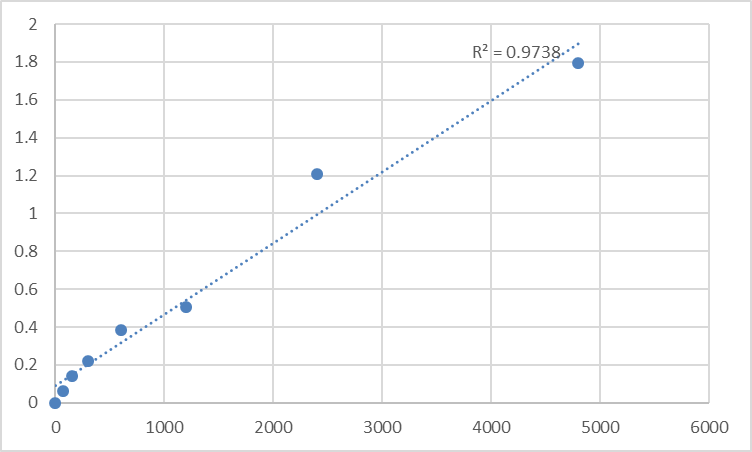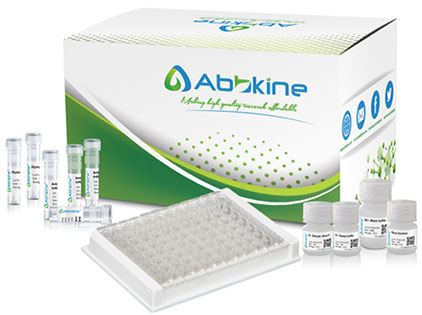| Product name | Rat Proteoglycan 4 (PRG4) ELISA Kit |
| Reactivity | Rat |
| Applications | ELISA |
| Applications notes | This Rat Proteoglycan 4 (PRG4) ELISA Kit employs a two-site sandwich ELISA to quantitate PRG4 in samples. An antibody specific for PRG4 has been pre-coated onto a microplate. Standards and samples are pipetted into the wells and anyPRG4 present is bound by the immobilized antibody. After removing any unbound substances, a biotin-conjugated antibody specific for PRG4 is added to the wells. After washing, Streptavidin conjugated Horseradish Peroxidase (HRP) is added to the wells. Following a wash to remove any unbound avidin-enzyme reagent, a substrate solution is added to the wells and color develops in proportion to the amount of PRG4 bound in the initial step. The color development is stopped and the intensity of the color is measured. |
| Detection method | Colorimetric |
| SampleType | Cell culture supernatants, Other biological fluids, Plasma, Serum |
| Assay type | Sandwich ELISA (quantitative) |
| Assay duration | Multiple steps standard sandwich ELISA assay with a working time of 3-5 hours. It depends on the experience of the operation person. |
| Alternative | PRG4; GS1-174L6.2; CACP; FLJ32635; HAPO; JCAP; MSF; SZP; bG174L6.2; OTTHUMP00000033580; articular superficial zone protein; bG174L6.2 (MSF: megakaryocyte stimulating factor ); lubricin; megakaryocyte stimulat |
| Kit components | • Rat Proteoglycan 4 microplate • Rat Proteoglycan 4 standard • Rat Proteoglycan 4 detect antibody • Streptavidin-HRP • Standard diluent • Assay buffer • HRP substrate • Stop solution • Wash buffer • Plate covers |
| Features & Benefits | Rat Proteoglycan 4 (PRG4) ELISA Kit has high sensitivity and excellent specificity for detection of Rat PRG4. No significant cross-reactivity or interference between Rat PRG4 and analogues was observed. |
| Calibration range | Please inquire |
| Limit of detection | Please inquire |
| Usage notes | • Do not mix components from different kit lots or use reagents beyond the kit expiration date. • Allow all reagents to warm to room temperature for at least 30 minutes before opening. • Pre-rinse the pipet tip with reagent, use fresh pipet tips for each sample, standard and reagent to avoid contamination. • Unused wells must be kept desiccated at 4 °C in the sealed bag provided. • Mix Thoroughly is very important for the result. It is recommended using low frequency oscillator or slight hand shaking every 10 minutes. • It is recommended that all samples and standards be assayed in duplicate or triplicate. |
| Storage instructions | The unopened kit should be stored at 2 - 8°C. After opening, please store refer to protocols. |
| Shipping | Gel pack with blue ice. |
| Precautions | The product listed herein is for research use only and is not intended for use in human or clinical diagnosis. Suggested applications of our products are not recommendations to use our products in violation of any patent or as a license. We cannot be responsible for patent infringements or other violations that may occur with the use of this product. |
| Background | Proteoglycan 4 is an approximately 345-kD proteoglycan specifically synthesized by chondrocytes located at the surface of articular cartilage, and also by some synovial lining cells. This protein contains both chondroitin sulfate and keratan sulfate glycosaminoglycans. The cDNA encodes a protein of 1,404 amino acids with a somatomedin B homology domain, heparin-binding domains, multiple mucin-like repeats, a hemopexin domain, and an aggregation domain. There are 3 consensus sequences for N-glycosylation and 1 chondroitin sulfate substitution site. The locus for autosomal recessive camptodactyly-arthropathy-coxa vara-pericarditis syndrome maps to chromosome 1q25-q31. This protein may act as a joint/intimal cell lubricant, and cell overgrowth may be primary to the pathogenesis of this protein. |
| Gene ID | 10216 |
| Alternative | PRG4; GS1-174L6.2; CACP; FLJ32635; HAPO; JCAP; MSF; SZP; bG174L6.2; OTTHUMP00000033580; articular superficial zone protein; bG174L6.2 (MSF: megakaryocyte stimulating factor ); lubricin; megakaryocyte stimulat |
| Accession | Q92954 |

Fig.1. Rat Proteoglycan 4 (PRG4) Standard Curve.

Fig.2. Abbkine ELISA kit is series of sandwich ELISA to quantitate specific protein in samples.
You must be logged in to post a review.
Reviews
There are no reviews yet.